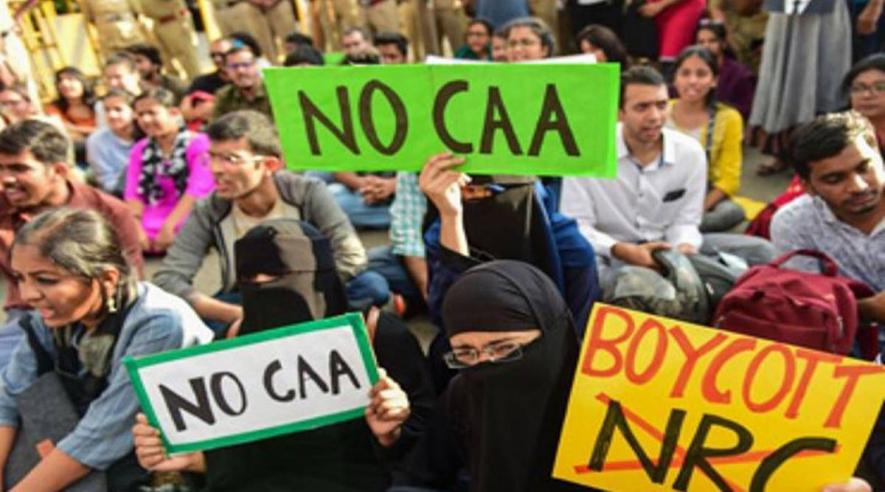Ten Reasons Why the Citizenship (Amendment) Act, 2019 is Unconstitutional

A division bench of the Supreme Court comprising Chief Justice of India U.U. Lalit and Justice S. Ravindra Bhat is scheduled to hear the petitions challenging the Citizenship (Amendment) Act, 2019 on Monday.
THE Citizenship (Amendment) Act, 2019 (‘CAA’) is an amendment to the Citizenship Act, 1955 and was enacted on December 12, 2019. It makes persons “belonging to Hindus, Sikhs, Buddhists, Jains, Parsis and Christians community from Afghanistan, Bangladesh or Pakistan, who entered into India on or before the 31st day of December, 2014” to, on the fulfilment of certain criteria, eligible to apply for Indian citizenship by registration or by naturalisation.
The CAA also seeks to relax the requirement of residence in India for citizenship through naturalization from the current norm of eleven years for persons staying in India legally to five years for the aforesaid category of persons.
The purported intelligible differentia sought to be made in the CAA, that is, religion and country of origin, have no nexus with the object sought to be achieved, that is, reprieve from persecution for the minority communities in the specified countries.
Thus, the CAA enunciates two classifications:
- Religion-specific classification, which treats a religious denomination as a whole as distinct group or class: it amends Section 2(1)(b) of the Citizenship Act by conferring discretion upon the Union Government to exclude Hindus, Sikhs, Buddhists, Jains, Parsis and Christians from the definition of ‘illegal immigrants’, thereby prioritizing these religious communities over others.
- Country-specific classification, by limiting the scope of acquiring citizenship to immigrants belonging to the enumerated minority communities from Afghanistan, Pakistan and Bangladesh.
The evolution of cultural and ethnolinguistic identity takes millennia and serves as a historical reservoir that provides people with feelings of belonging and security, shared values and aspirations and contributes to their wellbeing. It is an inextricable part of an individual, and is necessary for them to live a wholesome life, thus constituting a sine qua non for a life with dignity.
What are the grounds of unconstitutionality?
- The religion and country-specific classification in CAA is arbitrary, and in contravention of Article 14 of the Constitution. These classifications leave out persecuted minority groups in the majority religion of the included countries, and also leave out enumerated minority communities belonging to excluded neighbouring countries such as Myanmar and Sri Lanka, which were a part of British India and the larger British Empire, respectively. If the classification were based on degrees of harm, then the Rohingyas of Myanmar ought to be included, as the United Nations had described the Rohingyas as “the most persecuted minority in the world”. Similarly, Eelam Tamils have also been subject of enduring persecution in Sri Lanka.
- Religion specific classification: There is nothing, including no data, to show that the religious persecution against the concerned minorities in the given countries, that is, Bangladesh, Pakistan and Afghanistan, is significant enough to provide for an intelligible differentia to classify these minorities as separate from other persecuted minority sects among Muslims, like Ahmadis, for the stated purpose of protection against persecution.
- Country specific classification: If the criteria were of neighbouring countries, the exclusion of Sri Lanka and Myanmar is arbitrary and unreasonable, since these countries have manifest long-running persecution of Tamils and Rohingyas respectively, as elucidated above. If the criteria were people of undivided Indian origin, then only Pakistan, Bangladesh, and Myanmar could be included as these countries constituted undivided India prior to 1947. However, by including Afghanistan and excluding Myanmar from the list, it becomes clear that the criteria is other than the people of undivided Indian origin.
Thus, the purported intelligible differentia sought to be made in the CAA, that is, religion and country of origin, have no nexus with the object sought to be achieved, that is, reprieve from persecution for the minority communities in the aforesaid countries.
- Since religion constitutes an integral facet of an individual’s personal autonomy and thus is an immutable marker of identity, any classification based on religion and place of origin shall be deemed as an impermissible classification, and shall fall foul of the Constitution of India.
- The CAA modifies the scope of citizenship as envisioned in the Constitution in a discriminatory manner by introducing the concept of citizenship based on religious identity alone, though purportedly classifying on the basis of religion as well as persecution of such enumerated religious minorities in specified countries, thus violating the principle of secularism, equality and justice, which constitute the basic structure of the Constitution of India.
- The violation of the basic feature of secularism, which pervades the body and the soul of the Constitution, engenders the violation of a catena of fundamental rights. Notably, the ingredients of secularism is contained in various guarantees under Part III of the Constitution in so far as the part guarantees an individual equal treatment by law irrespective of his/her religion (Article 14), neutrality of State with respect to religion (Articles 15 and 16), freedom of religion (Articles 25, 26, 27 and 28) and enhanced protection to minorities (Articles 29 and 30). Thus, such violations of a catena of fundamental rights makes the violating law ultra vires.
Also read: Lost in Space: Finding the voice of the judiciary in the CAA Narrative
- There is no basis for reducing the eligibility criterion for application for citizenship for naturalisation to six years for the category of persons classified by the CAA from the normally applicable eleven years for foreigners staying in the country legitimately. Hence the same is discriminatory as well as arbitrary, and falls foul of Article 14 of the Constitution.
- The choice of cut-off date is arbitrary and hence violative of the Constitution. Assuming that the Parliament has the power to set the cut-off date for considering certain immigrants as citizens as December 31, 2014, the choice of the cut-off date must bear rational nexus with the stated object of the Act. There is no evidence to indicate that the migration that took place up to December 31, 2014 was based on religious persecution alone, or even primarily that.
- The Act confers unlimited, unguided discretionary powers on the executive to grant citizenship, and is thus violative of Article 14 of the Constitution. The defining criteria on the basis of which the person will not be treated as illegal immigrant must be found in the statute itself, and is not to be left for the rules, regulations and notifications to elucidate the same, as it amounts to excessive delegation of legislative power, thus violating the basic feature of separation of powers. The CAA is silent on the same, including on the requirement of proof of persecution of the category of persons delineated in the CAA, for them to be granted citizenship. This is in contravention of the provisions of the Constitution and is hence void.
Also read: The Debates over CAA
Are there any Assam-specific grounds?
- The CAA violates and is contrary to the binding obligations of the Union Government under the Assam Accord, which carries the sanctity of an agreement. It was stated in the Accord that the “government have all along been most anxious to find a satisfactory solution to the problem of foreigners in Assam” and was alive to the “apprehensions regarding the continuing influx of foreign nationals into Assam and the fear about adverse effects upon the political, social, culture and economic life of the State”, and that the Accord was reached “keeping all aspects of the problem including constitutional and legal provisions, international agreements, national commitments and humanitarian considerations”. By providing for a path towards citizenship for the category of persons delineated in the CAA, the government has reneged on its commitments under the Accord, which put the cut-off date for Assam for the purpose as March 24, 1971. This has reignited the apprehension of the Assamese people.
- The CAA, thus, violates the constitutional safeguards of the Assamese people as guaranteed under Article 29 as well as Article 21 of the Constitution. It is to be noted that the evolution of cultural and ethnolinguistic identity takes millennia and serves as a historical reservoir that provides people with feelings of belonging and security, shared values and aspirations and contributes to their wellbeing. It is an inextricable part of an individual, and is necessary for them to live a wholesome life, thus constituting a sine qua non for a life with dignity. Hence, any disintegration of a cultural complex within which an individual resides necessarily violates not only cultural rights under Article 29 but also the very right to life with dignity as enshrined in Article 21 of the Constitution.
What are the grounds with respect to the combined effect of CAA with NRC?
- The combined effect of CAA and the proposed National Register of Indian Citizens (‘NRC’) provided under the Citizenship (Registration of Citizens and Issue of National Identity Cards) Rules, 2003 in case certain persons do not find their names in the future NRC is that they may be deprived of citizenship; but among such persons, certain sections of those belonging to the Hindu, Sikh, Buddhist, Jain, Parsi and Christian communities may find a way back into the NRC through the provisions of CAA, whereas those belonging to Muslim community shall remain excluded (since the CAA lays out no requirement of proof of persecution or even of residence in Afghanistan, Bangladesh or Pakistan from the category of persons delineated by it).
Though there are several constitutional infirmities in the proposed NRC exercise itself, when it combines with the CAA, it directly and inevitably puts mainly the Muslim citizens of India at the risk of losing citizenship. Hence, the same is discriminatory and falls foul of both Article 14 and the basic feature of secularism enshrined in the Constitution of India.
The resolution to the illegal immigration and refugee crisis does not lie in providing citizenship on the discriminatory ground of religion and country of origin, but through diplomacy as well as by devising a holistic asylum policy based on the Constitutional guarantees of equality, fairness and due process of law, and on international norms.
The combined operation of the CAA and the NRC, and the consequential deprivation of citizenship, directly and inevitably affects a catena of fundamental and other rights enshrined in the Constitution of India since citizenship is a gateway to a multitude of rights. Since the potential NRC exercise would be pervasive and affect the whole of the population of India, such an impact on fundamental and other rights shall be potentially widespread, thus further making the process suspect in the eyes of the Constitution.
The resolution to the illegal immigration and refugee crisis does not lie in providing citizenship on the discriminatory ground of religion and country of origin, but through diplomacy as well as by devising a holistic asylum policy based on the Constitutional guarantees of equality, fairness and due process of law, and on the international norms enshrined in the International Covenant on Civil and Political Rights, the Convention Relating to the Status of Refugees, and the International Convention on the Elimination of All Forms of Racial Discrimination. An appropriate legal framework should be devised to process requests for refugee status and citizenship, and to ascertain the rights and obligations flowing from such status.
Needless to say, any such policy must take into account the balance between the rights of the citizens, and the need to provide an effective system for the protection of refugees and asylum seekers.
Get the latest reports & analysis with people's perspective on Protests, movements & deep analytical videos, discussions of the current affairs in your Telegram app. Subscribe to NewsClick's Telegram channel & get Real-Time updates on stories, as they get published on our website.
























